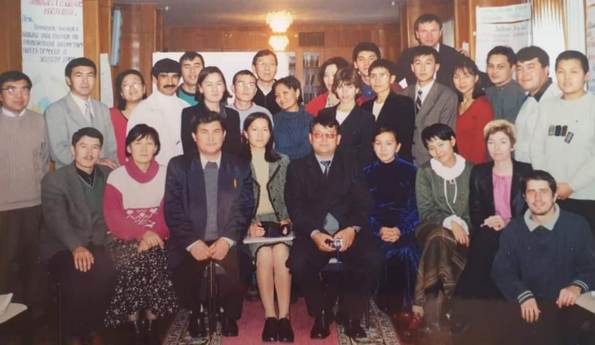Winnie the Pooh was on to something. Anyone who has squeezed a chunk of fresh honeycomb and tasted the golden sugary ooze would agree that getting one’s head stuck inside a pot is well worth the risk.
But keeping bees, and enjoying the sweet profit of their labor, requires special skills and equipment, something many producers in Ethiopia lack.
Many still rely on physically demanding and less productive methods, like setting empty logs in trees and climbing up to get the honey out.
The Ethiopian Sustainable Tourism Alliance, a U.S. Agency for International Development-supported program implemented by Counterpart International, has released a training video that makes up for that.
“This video is the first of its kind in Ethiopia, and sorely needed not only for beekeepers but also for input suppliers, collectors, processors and exporters,” says Gezahegne Tadesse, the lead beekeeping expert producing the video. “We firmly believe that this video will become a benchmark for all such training videos going forward.”
The video, which is designed to complement hands-on training, is being produced in Amharic, Oromiffa and English.
“The Bee Management and Honey Products two disk video was created to address the lack of audiovisual beekeeping training material in the country,” says Brian Chang, Counterpart’s Senior Technical Officer. “We had to find a medium that would reach the maximum number of communities.”
Aggressive stars and shy extras
Production of the video wasn’t easy. First, the team had to travel around to rural areas of Ethiopia to coax permission from honey farmers to film them at work.
That was followed by the more difficult part of the filming. African bees are particularly aggressive, so the production team could only film at dusk when the bees were calmer, creating a rush to finish before the daylight ran out.
Then, they had to start over once they realized—near the end of honey harvesting season no less—that the initial footage was no good. The whole process took three months.
“Our beekeeping experts and videographers were creative and for the most part we were able to find the footage we needed,” says Chang.
The video is for farmers, emerging beekeepers and also agricultural extension workers who work with rural communities. Using a training video allows even those with limited literacy to access and understand the information.
Training people to become beekeepers or improve their techniques achieves several goals at once. Most tangibly: more honey and increased income for the producers.
The project is currently working with 500 households, some of which are affected by HIV/AIDS. Beekeeping is a good potential job for these individuals, as the hives are easy to reach and the work physically undemanding.
ESTA also introduced Resource User Groups to beekeeping—associations of severely resource-dependent and economically-challenged Ethiopians whom the project also engaged in land rehabilitation for climate change mitigation.
Besides the training, the project provided new beekeepers with modern hives and tools that will boost their honey and bee product production, and encouraged them to form cooperatives and enterprises.
Each new business will make a signed commitment to use the hives properly. The local agriculture, cooperative, and tourism offices will also sign a Memorandum of Understanding pledging their support as responsible partners beyond the project’s official end date.
The benefits of bees
They have a vested interest in the beekeeper’s success, and that of the bees for that matter.
Healthy bee populations boost the productivity of the land, since the insects pollinate crops, flowers and trees in their aerial roaming.
With 80 percent of Ethiopia’s population relying in some way on the land to make a living, the project is less about a sweet product and squarely about survival. Food security has been a focus of USAID’s Feed the Future programs, as well as Ethiopian Government policies.
The resulting benefits to food security are not to be overlooked in a place like Ethiopia, where deadly famines still lurk in families’ memories.
But no one is discounting the draw of a fresh-off-the-comb jar of local honey.
Ethiopia is already the largest producer of honey in Africa, but demand for honey and the other natural byproducts like wax and royal jelly remains high, meaning the project not only helps the vulnerable, but is demand-driven too.
For-profit honey processors and exporters have a stake as well, and may even investigate further training opportunities that would modernize beekeeping on a larger scale and ensure a steady supply of the sweet stuff.
ESTA participants hope increased beekeeping can allure tourists interested in following a “honey route” through the Ethiopian countryside—learning how honey is made, its history and unique local tastes, and the lives and culture of the harvesters.
Such experiences could be integrated into existing Community Conservation Areas recently inaugurated by Counterpart and local partners, which offer hiking, historical excursions, and local culture and crafts.
But first, as any bee colony knows, there is hard work to be done.
About 500 copies of the new training video will be distributed to USAID/President’s Emergency Plan for AIDS Relief and Counterpart’s local partners.
“We hope it will be used by the people who need it the most,” says Chang. “We hope that as they become immersed in beekeeping, they can bolster their income by using natural resources sustainably, while simultaneously improving the land and continuing to develop an industry that will one day rival other Ethiopian exports such as coffee.”
“We are excited to see the results,” Chang says.
And, no doubt, taste them.




